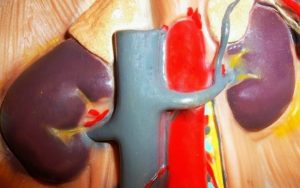Thyroid affects function of many organs. Thyroid and kidneys have a close relationship. Thyroid hormones, T3 predominantly, but also T4 regulate the renal blood flow and the glomerular filtration rate (GFR). T3 thyroid hormone is important in the production of many kidney regulating molecules such as renin. Sub-optimal thyroid hormonal replacement can affect the health of kidneys negatively. Kidneys can eventually decrease in size in hypothyroidism or increase in size in hyperthyroidism (although prolonged, severe and untreated hyperthyroidism may eventually result in deterioration of kidneys). Thyroid hormone have effects on cardiovascular system and the flow of blood into the kidneys. Hypothyroidism can result in abnormalities in renin release. This can cause constriction of blood vessels and fluid retention. This situation is very bad for the heart. In hypothyroidism, the glomerular filtration rate (GFR) can decrease substantially. Opposite goes for hyperthyroidism. Untreated hyperthyroidism can cause kidney damage or make chronic kidney disease worse.
On the other hand, people with renal diseases can have worsening of their symptoms of hypothyroidism as protein bound thyroid hormones may be lost by ‘leaky’ kidneys. People on thyroid hormonal therapy and renal problems may need to take higher doses of hormones.
However thyroid hormones are not the only thyroid related molecules which can affect the kidneys. Thyroid Stimulating hormone produced by pituitary gland in our brain to stimulate thyroid hormonal production in the thyroid also has effects on kidneys. Thyroglobulin molecule produced in thyroid may also affect kidneys in autoimmune thyroid disease. Therefore, optimal and normal levels of these two molecules are also important.
Thyroid autoimmune disease can also affect kidneys. When I was six years old I was diagnosed with kidney problems and spend three months in a hospital. I was on a strict gluten free diet in a hospital, I had to spend most of my time in bed and had daily injections of antibiotics and some others. I remembered my kidneys feeling ’heavy”, my urine was dark brown, I felt very weak and had nausea. I had cravings for bread and bread rolls and one breakfast I attempted to steal one bread roll from the breakfast table I shared with my hospital friends. Unfortunately, despite hiding it, I was discovered by a nurse and the bread roll was taken from me. Looking back I believe my kidneys problems were directly related to my thyroid autoimmunity problems. Fortunately, I have recovered without farther problems.
Thyroid autoimmune disease may be connected to immune complex glomerulonephritis (inflammation and swelling of the tiny filters called glomeruli in kidneys) which causes the kidneys to stop working properly. Generally people with glomerulonephritis recover completely with medical care. It is very rare for it to cause complication such as renal failure.
It is interesting that it was found that the kidneys can express thyroid hormone stimulating receptor (TSHR) (4, 8). Perhaps it serves as a boost system/ protective back up system for kidneys when thyroid hormonal level is low and thyroid stimulating hormone levels are high as seen in hypothyroidism. It was found in a study (9) that exogenous thyroid stimulating hormone improves renal function in patients with normal healthy thyroid hormonal levels. Also it was shown in a study that injecting recombinant human TSH improved estimated glomerular filtration rate (eGFR) in kidneys in patients with thyroid replacement therapy, which means their kidney function was improved.
Therefore it is possible that kidneys can be a target of thyroid autoimmunity as TSHR is expressed in thyroid but also in other organs such as kidneys. It is the main molecule to which antibodies are produced in Grave’s disease.
Another molecule to which antibodies are produced in thyroid autoimmunity (more so in Hashimoto’s thyroiditis) is thyroglobulin, a molecule present in thyroid. Increased levels of thyroglobulin, a molecule which is the building block of thyroid hormones, secreted by thyroid into blood, indicate thyroid damage. Higher levels are seen in thyroid autoimmunity or thyroid cancer. Kidneys were also found to express a protein which is very similar to thyroglobulin (4,10). The function of this similar protein in kidneys is stipulated to be on the DNA level in regulating kidney cell growth. The anti-thyroglobulin antibodies found in autoimmune thyroid disease complex with this similar protein and also with thyroid thyroglobulin (secreted from thyroid into blood) to form immune complexes and produce inflammatory processes in the kidneys. Another issue with immune complex glomerulonephritis is that another molecule called megalin (a receptor that binds thyroglobulin in kidneys), Megalin is regulated by thyroid stimulating hormone. Thyroid stimulating hormone binds to TSH receptors (as mentioned previously thyroid stimulating hormone receptor was found to be expressed in kidneys). The immune system has lower tolerance for this molecule in kidneys in thyroid autoimmunity, especially Hashimoto’s thyroiditis. Megalin is also important for uptake of other molecules by kidneys such as albumin and vitamin D-binding protein. This might be connected to lowered vitamin D level in people with thyroid autoimmunity.
Immune complex glomerulonephritis can occur with Grave’s disease (as it was in my case), especially in children and it is possible that it may be triggered by an infection or gluten/casein sensitivity. However it can also occur in older people as discussed in a study of a 60 year old hyperthyroid woman with long-standing Graves’ disease treated with methimazole (6).
The rates of kidney involvement in people with thyroid autoimmunity can be as high as in 10–30% of cases (2) and it is much higher in the case of Hashimoto’s thyroiditis when compared with Grave’s disease. Around half of people with Hashimoto’s thyroiditis have a moderate increase in the level of urine albumin due to abnormal permeability of kidneys which is associated with renal damage. It might be therefore advisable (as suggested in scientific study (1) for kidney function to be monitored with thyroid autoimmunity, especially for Hashimoto’s thyroiditis patients.
Basically if your thyroid is off, the kidneys will not function optimally and vice versa. The renal blood flow, glomerular filtration rate, electrolytes and kidney structure and size will be affected. Kidney function test: eGFR and serum creatinine levels can be an indicator of thyroid function for people with thyroid problems. Serum creatinine levels are decreased in hyperthyroidism and increased in hypothyroidism. GFR is increased in hyperthyroidism and decreased in hypothyroidism. Kidney stones can be connected to hypothyroidism. It may relate to the altered kidney filtration rates and imbalances between calcium and magnesium with possible magnesium deficiency.
It is important to have normal blood pressure for kidney health which can also be a reflection of a thyroid function. Cranberry juice has a positive effect on kidney health in general.
References:
- Domenico Santoro, Carmela Vadalà, Rossella Siligato, Michele Buemi, and Salvatore Benvenga. Autoimmune Thyroiditis and Glomerulopathies. Front Endocrinol (Lausanne). 2017; 8: 119.
- Ronco P, Debiec H. Pathophysiological lessons from rare associations of immunological disorders. Pediatr Nephrol (2009) 24(1):3–8.
- Yuqian Luo, Yuko Ishido, Naoki Hiroi, Norihisa Ishii, and Koichi Suzuki.The Emerging Roles of Thyroglobulin. Advances in Endocrinology. Volume 2014 (2014), Article ID 189194.URL: https://www.hindawi.com/archive/2014/189194/
- Sellitti DF, Akamizu T, Doi SQ, Kim GH, Kariyil JT, Kopchik JJ, Koshiyama H. Renal expression of two ‘thyroid-specific’ genes: thyrotropin receptor and thyroglobulin. Exp Nephrol. 2000 Jul-Oct; 8(4-5):235-43.
- Zheng G, Marino’ M, Zhao J, McCluskey RT. Megalin (gp330): a putative endocytic receptor for thyroglobulin (Tg). Endocrinology. 1998 Mar; 139(3):1462-5.
- Horvath F Jr, Teague P, Gaffney EF, Mars DR, Fuller TJ. Thyroid antigen associated immune complex glomerulonephritis in Graves’ disease. Am J Med. 1979 Nov; 67(5):901-4.
- Michele Marinò, Gang Zheng and Robert T. McCluskey. Megalin (gp330) Is an Endocytic Receptor for Thyroglobulin on Cultured Fisher Rat Thyroid Cells. Journal of Biological Chemistry. URL: http://www.jbc.org/content/274/18/12898.full
- Dutton CM, Joba W, Spitzweg C, Heufelder AE, Bahn RS. Thyrotropin receptor expression in adrenal, kidney, and thymus. Thyroid 1997 Dec; 7(6):879-84.
- Flore Duranton, Anouchka Lacoste, Patrick Faurous, Emmanuel Deshayes, Jean Ribstein, Antoine Avignon, Georges Mourad and Àngel Argilés. Exogenous thyrotropin improves renal function in euthyroid patients, while serum creatinine levels are increased in hypothyroidism. Clinical Kidney Journal, Volume 6, Issue 5, 1 October 2013, Pages 478–483. URL: https://www.ncbi.nlm.nih.gov/pmc/articles/PMC4438406/
- Wu H, Suzuki S, Sellitti DF, Doi SQ, Tanigawa K, Aizawa S, Akama T, Kawashima A, Mishima M, Ishii N, Yoshida A, Hisatome I, Koles NL, Katoh R, Suzuki K. Expression of a thyroglobulin (Tg) variant in mouse kidney glomerulus. Biochem Biophys Res Commun. 2009 Nov 13;389(2):269-7.
- Gopal Basu and Anjali Mohapatra. Interactions between thyroid disorders and kidney disease. Indian J Endocrinol Metab. 2012 Mar-Apr; 16(2): 204–213.

